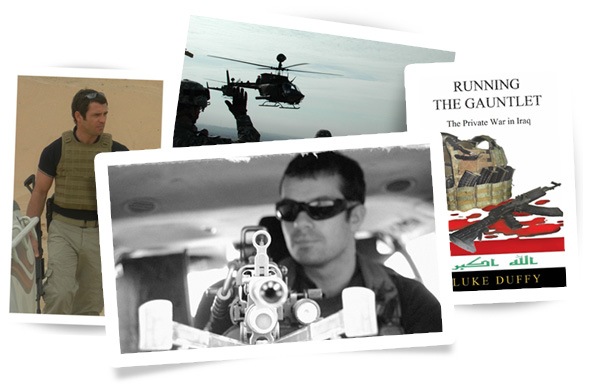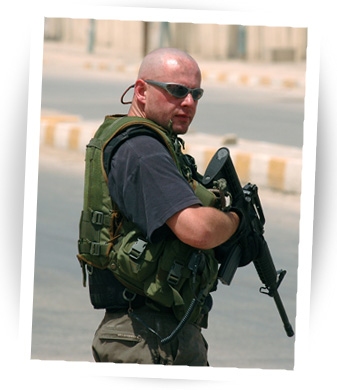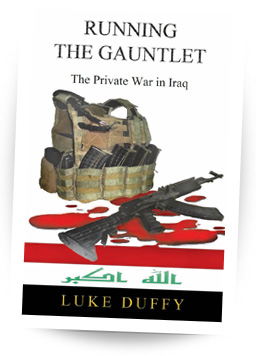Author Interview with Luke Duffy
Luke Duffy is a former Paratrooper, and present day contractor on the circuit in Iraq. He is the newly published author of ‘Running the Gauntlet – The Private War in Iraq’, the book which recounts his transition from British Armed Forces to Private Security Contractor and his experiences during the bloodiest periods of the post Iraq invasion. The Circuit Magazine caught up with him recently to discuss the book, his experiences of writing it and getting it published and why it was so important for him to tell his story.
Prologue – ‘The Gold Rush’
In 2003, Coalition Forces led by America and Great Britain invaded Iraq. In the immediate aftermath the country was left lawless and in turmoil. The army had disintegrated and the police force was none existent. Much of the once powerful nation’s infrastructure was smashed and destroyed while the rest of the country, after years of crippling sanctions, had fallen into disrepair.
Western construction companies moved in to begin the rebuilding of Iraq and all the while, the insurgency campaign gained momentum. Kidnapping and attacks on Westerners were becoming more frequent and adventurous, both in scale and daring. The death toll was rising.
Many professional soldiers, from all over the world, realised that a lot of money could be made on the ever growing second front of the Iraq war. They left in their droves to join the ‘Gold Rush’.
Soon, these privately funded soldiers found themselves caught in savage, brutal attacks and gun battles in the streets of Iraq on a daily basis. ‘Running the Gauntlet: The Private War in Iraq’ is the no punches pulled true account of one man’s experiences of the anarchy that reigned after the fall of Saddam.
Circuit Magazine: Luke, much has been written about the war in Iraq, what does ‘Running the Gauntlet’ offer the reader that they may not have read or experienced before?
Luke Duffy: I have included the action and the details of many incident’s; such as shoot outs and road side bombs but I would like to think that I’ve offered the reader something deeper, an insight into the life of the men who work on the Private Security Circuit.
CM: It’s certainly a very personal account, wrote through your eyes but one of the things I found most refreshing about it was your brutal honesty, whether it be about the motivation of PSC’s, your own shortcomings as a person or the truth about what goes on behind closed doors in Iraq. What was your main motivation for wanting to tell this story and in this manner?
Luke: Too many times I have read articles and books, or watched news reports and documentaries, portraying the men in my line of work as ‘mercenaries’ or ‘private militia’. Maybe to an extent we are, but who wouldn’t want a job where they get paid good money, doing what they know best? Apart from running around and fighting insurgents, the men and women working the circuit, are also human. We all have families; we all have lives outside of Iraq. We love, laugh and grieve just like normal people, we are very far from being the superhuman style Terminators that certain movies and some books would have the public believe.
CM: The book depicts of the sheer brutality of men placed in extraordinary situations and under extreme tensions, with this in mind, how would you describe the theme and emotion of it?
Luke: I have written from my point of view and how I saw and experienced things on the ground in order to give a true personal account. There are a lot of funny moments, written with typical British squaddie humour. There are many pages of action, tension, sadness and loss and some controversial moments too. Reports in the media about events that I was personally involved in which have either been falsified, embellished or simply blown out of all proportion. I have strived to recreate the atmosphere and mood of these events in as much accuracy as possible.
CM: The ‘Squaddie humour’ is very evident throughout the book and creates a strong basis from which everything else is built upon. Was that a deliberate tactic; making it easier to address otherwise savage and terrifying situations?
Luke: The British soldier has always been well known for his dark humour, especially in times of hardship. On the Private Security Circuit, the same dark humour exists due to the fact that a great many of us are ex soldiers and still facing the same hardships.
A soldier has to deal with events and situations that an ordinary civilian wouldn’t be able to cope with and the humour helps us through it. Some people may see our light hearted reactions to serious situations as callous or fake bravado but it’s just how we deal with traumatic events in order for us to continue to function in an environment like Iraq.
Writing the book with humour came naturally to me. I wanted the reader to imagine that I was sitting by their side and telling them my story, so it was important for me to write as I saw things and dealt with them. Humour is an integral part of my personality, so I needed to express it.
CM: At what point did you consider writing a book? Was there a defining moment that made you think, I need to tell this story?
Luke: It was after Liam was killed. I had thought about writing my story before that, but Liam’s death was the defining moment that gave me the push that I needed. I began to consider my own mortality and the thought of not having my story on paper, even if it went unpublished, was almost as though my memories and experiences would fade with me should the worst happen. I have always believed it is not so much death that men fear, but oblivion.
CM: So, just how difficult is the process of getting from an idea to seeing the printed and published hard copy of your book on the shelves?
Luke: Finding a publisher was hard. Once I had finished my manuscript I began sending out letters and samples to publishing companies and agents. It seemed that no one was interested and I began to lose heart in the whole thing. It is just one of those things that you have to keeping plugging away at.
After finding a publisher that agreed to take the book on, the process was pretty quick. The manuscript was submitted and the majority was done via email and conference calls where we discussed the layout and the overall edit and look of the book.
Before the book was put in to full print and made available for retail, I was sent the final hard and electronic proof copy to approve.
CM: That must have been a special moment, how did it make you feel seeing it on bookshelves?
Luke: It was a great feeling to finally have the hard copy in my hands and see my words in print. I felt like a weight had been lifted off my shoulders. I was beginning to think it would never be published and that the manuscript would just become a family heirloom passed on through generations. To finally see it though, actually published, was a very proud moment in my life.
CM: What has been the reaction from family, friends and colleagues in terms of support for the project?
Luke: I couldn’t ask for better. My family and friends have been very supportive and have encouraged me through the whole process.
CM: So, what next? Do you see any more books on the horizon or was this simply a story that you had to tell?
Luke: I love reading and I’ve developed a greater love for writing. I plan to make this my career and I have already finished my second book, with a third and fourth on the horizon. I’ve never been short on imagination and as long as I can think up stories to tell, I’ll continue to write. Running the Gauntlet was a story that I needed to tell, but my next three books are a different genre which I hope that people will enjoy reading just as much.
CM: Going back to the book, I wanted to ask you about your experiences of being ‘high profile’, a period where you were subject to regular IED attacks and gun battles, what effect does this have on the team morale and its dynamics?
Luke: During that time road side bombs and gun battles were regular; rocket and mortar attacks on the bases in which we lived were like clockwork. Being high profile meant we could operate more aggressively but it also made us more of a target to the insurgents, we just couldn’t help but draw fire.
The team itself was a mix match bunch of guys with strong characters. Some were old hands in the circuit and others were fresh faced and enjoying a new life style. The events and antics that I have written about would bring a wry smile and nod of acknowledgement to most in this line of work.
CM: Luke, you’ve spoken very honestly about the stresses of the job and the strain that it has put on your personal life. Why did you decide to give the reader such an intimate insight?
Luke: I have deliberately laid bare my personal life within the pages of the book; I did this in the hope of giving the reader a more personal point of view of my story, rather than seeing me as just another mercenary.
CM: I think it adds a very personal touch to the book. One chapter in particular which is high in emotion is where you recount the loss of your best friend, Liam, to whom the book is dedicated. Liam’s death hit you hard and you share with us the emotional scars that have been left behind. How did this affect you?
Luke: Emotionally I was a wreck, and I’ve not been ashamed to put this into writing but on the outside, I rebelled and developed a self destructive nature for a while. I found myself getting into fights over the slightest discrepancy and I began to alienate myself from the people who matter the most. At the time, it was the only way that I could deal with my grief.
CM: I’m certain there will be people reading this for which your story really resonates; there may be some who also feel like they have a story waiting to be told. If you could offer one piece of advice to anyone considering publishing their own book, what would that be?
Luke: Write it! And don’t let the red tape of the publishing industry put you off. Many publishing companies and agents seem to be more wrapped up in formats and font sizes rather than the actual story. In the age of the internet it has become easier for people to write and consequently most publishers and agents have become snowed under with submissions, but don’t let that deter you. If you have a story worth telling, then fight through!
CM: Luke, on behalf of all the readers of the Circuit Magazine I want to thank you for taking the time to share your story with us and we wish you lots of success with the book.
Interview with Jon Moss
You can buy ‘Running the Gauntlet: The private War in Iraq’ by Luke Duffy from all good book stores and online. In addition, it is now available for download as an ebook from Amazon. RRP –Paperback: £13.99/$21.93 or ebook £6.58/$10.81.
Facebook: “Running the Gauntlet” by Luke Duffy





Leave a Reply